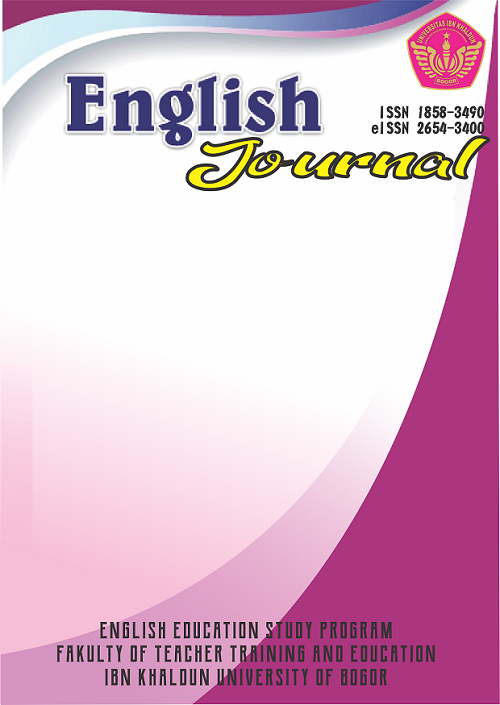A SURVEY OF INDONESIAN EFL UNDERGRADUATE STUDENTS' SELF-REGULATED MOTIVATION TO SPEAK ENGLISH
DOI:
https://doi.org/10.32832/english.v17i1.13759Abstract
Self-Regulated Motivation (SRM) is one of Self-Regulated Learning (SRL) aspect that focus only on motivation control or regulation. This study aims to identify college students' SRM levels to speak English and the difference between male and female. The participants were 92 English Language Department students of a private university in Yogyakarta. The data were collected through SRMIS-EFL questionnaire. The questionnaire consists of four factors (task value evaluation, regulation of learning environment, regulation of affect, and regulation of classroom environment) with 20 total items. A descriptive statistic was used to analyze students' SRM level and an independent sample t-test was also used to see the difference of SRM level between male and female students. The analysis of the data showed that generally students had a high SRM level. The highest factor was task value evaluation and the lowest was regulation of learning environment. Related to gender, this study revealed that male and female students show a similar SRM levels and had no difference.
References
Aguila, Kathreen B., and Ignatius Harjanto. 2016. "Foreign Language Anxiety and Its Impacts on Students' Speaking Competency.” ANIMA Indonesian Psychological Journal 32(1):29–40. doi: 10.24123/aipj.v32i1.582.
Ali, Zulfiqar, Farzana Masroor, and Tariq Khan. 2020. "Creating Positive Classroom Environment For Learners ' Motivation Towards Communicative Competence In The English Language.” Journal of the Research Society of Pakistan 1(57):317–28.
Alotumi, Mohialdeen. 2021. "EFL College Junior and Senior Students' Self-Regulated Motivation for Improving English Speaking: A Survey Study.” Heliyon 7(4). doi: 10.1016/j.heliyon.2021.e06664.
Bademcioglu, Mehtap, Hakan Karatas, and Atilla Ergin. 2017. "The Prediction of Undergraduates' Self-Regulation Strategies, Motivational Beliefs, Attitudes towards English, and Speaking Anxiety on Foreign Language Classroom Anxiety.” Journal of Human Sciences 14(1):571. doi: 10.14687/jhs.v14i1.4132.
Baeten, Marlies, Filip Dochy, and Katrien Struyven. 2013. "The Effects of Different Learning Environments on Students' Motivation for Learning and Their Achievement.” British Journal of Educational Psychology 83(3):484–501. doi: 10.1111/j.2044-8279.2012.02076.x.
Bima, M. Fadjar, and Sugeng Susilo Adi. 2021. "Classroom Environment, Students Motivation, and Speaking Anxiety Among Vocational High School Students in English Lesson.” Erudio Journal of Educational Innovation 8(1):83–94. doi: 10.18551/erudio.8-1.8.
Boekaerts, Monique. 1996. "Self-Regulated Learning at the Junction of Cognition and Motivation.” European Psychologist 1(2):100–112. doi: 10.1027/1016-9040.1.2.100.
Birgit Spinath. 2009. "How Do Motivational Regulation Strategies Affect Achievement: Mediated by Effort Management and Moderated by Intelligence.” Learning and Individual Differences 19(4):621–27. doi: 10.1016/j.lindif.2009.08.006.
Bown, Jennifer, and Cynthia J. White. 2010. "Affect in a Self-Regulatory Framework for Language Learning.” System 38(3):432–43. doi: 10.1016/j.system.2010.03.016.
Hacker, Douglas J., John Dunlosky, Arthur C. Graesser, Barry J. Zimmerman, and Adam R. Moylan. 2009. "Self-Regulation from: Handbook of Metacognition in Education Routledge.” 1. doi: 10.4324/9780203876428.ch16.
Ilishkina, Daria I., Anique de Bruin, Andrey I. Podolskiy, Marina I. Volk, and Jeroen J. G. van Merrií«nboer. 2022. "Understanding Self-Regulated Learning through the Lens of Motivation: Motivational Regulation Strategies Vary with Students' Motives.” International Journal of Educational Research 113(February):1–14. doi: 10.1016/j.ijer.2022.101956.
Kryshko, Olena, Jens Fleischer, Julia Waldeyer, Joachim Wirth, and Detlev Leutner. 2020. "Do Motivational Regulation Strategies Contribute to University Students' Academic Success?” Learning and Individual Differences 82. doi: 10.1016/j.lindif.2020.101912.
Nancy Collins. 2009. "Motivation and Self-Regulated Learning:Theory, Research, and Applications (Review).” The Journal of Higher Education 80(4):476–79. doi: 10.1353/jhe.0.0057.
Panadero, Ernesto. 2017. "A Review of Self-Regulated Learning: Six Models and Four Directions for Research.” Frontiers in Psychology 8(APR).
Pintrich, Paul R. 2000. THE ROLE OF GOAL ORIENTATION IN SELF-REGULATED LEARNING. Zimmer-man.
Uztosun, Mehmet Sercan. 2020. "The Development of a Scale for Measuring the Self-Regulated Motivation for Improving Speaking English as a Foreign Language.” Language Learning Journal 48(2):213–25. doi: 10.1080/09571736.2017.1335766.
Uztosun, Mehmet Sercan. 2021. "Foreign Language Speaking Competence and Self-Regulated Speaking Motivation.” Foreign Language Annals 54(2):410–28. doi: 10.1111/flan.12559.
Wolters, Christopher A. 1998. Self-Regulated Learning and College Students' Regulation of Motivation. Vol. 90.
Wolters, Christopher A. 2003. "Regulation of Motivation: Evaluating an Underemphasized Aspect of Self-Regulated Learning.” Educational Psychologist 38(4):189–205. doi: 10.1207/S15326985EP3804_1.
Wolters, Christopher A., and Maria B. Benzon. 2013. "Assessing and Predicting College Students Use of Strategies for the Self-Regulation of Motivation.” Journal of Experimental Education 81(2):199–221. doi: 10.1080/00220973.2012.699901.

















1.png)




